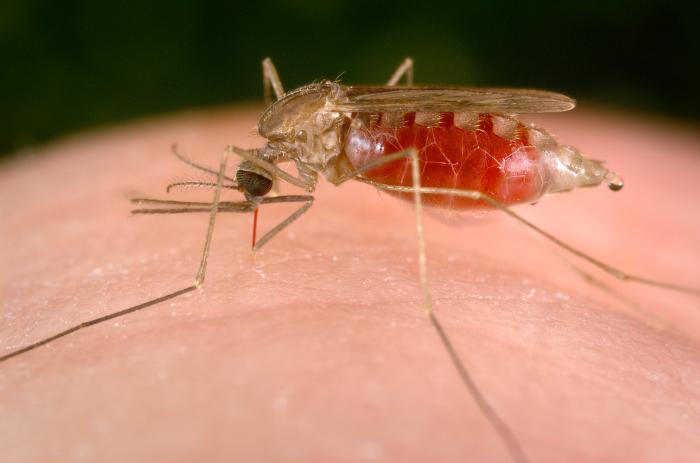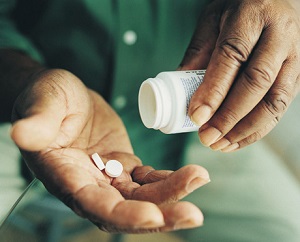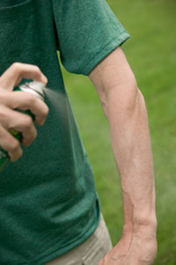
What is malaria?

Malaria is a disease spread through mosquito bites. Symptoms usually appear within in 7-30 days but can take up to one year to develop. Symptoms include high fevers, shaking chills, and flu-like illness. Without treatment, malaria can cause severe illness and even death.
Who is at risk?
Malaria occurs in Africa, Central and South America, parts of the Caribbean, Asia, Eastern Europe, and the South Pacific (See maps: Eastern Hemisphere and Western Hemisphere). People spending time outdoors, including sleeping outside, are at higher risk for malaria. Every year about 1700 cases of malaria and 5 deaths occur among international travelers from the United States. Read stories of people who have had malaria.
What can travelers do to prevent malaria?

Travelers can protect themselves from malaria by taking prescription medicine and preventing mosquito bites.
Take prescription medicine if recommended for your destination:
- Talk to your doctor about which medicine is best for you.
- There are prescription medicines you can take to prevent malaria.
- Take this medicine before, during, and after your trip.
Prevent mosquito bites:

- Cover exposed skin by wearing long-sleeved shirts, long pants, and hats.
- Use an appropriate insect repellent as directed.
- Higher percentages of active ingredient provide longer protection. Use products with the following active ingredients:
- DEET (Products containing DEET include Off!, Cutter, Sawyer, and Ultrathon)
- Picaridin (also known as KBR 3023, Bayrepel, and icaridin products containing picaridin include Cutter Advanced, Skin So Soft Bug Guard Plus, and Autan [outside the US])
- Oil of lemon eucalyptus (OLE) or PMD (Products containing OLE include Repel and Off! Botanicals)
- IR3535 (Products containing IR3535 include Skin So Soft Bug Guard Plus Expedition and SkinSmart)
- Always follow product directions and reapply as directed:
- If you are also using sunscreen, apply sunscreen first and insect repellent second.
- Follow package directions when applying repellent on children. Avoid applying repellent to their hands, eyes, and mouth.
- Use permethrin-treated clothing and gear (such as boots, pants, socks, and tents). You can buy pre-treated clothing and gear or treat them yourself:
- Treated clothing remains protective after multiple washings. See the product information to find out how long the protection will last.
- If treating items yourself, follow the product instructions carefully.
- Do not use permethrin directly on skin.
- Stay and sleep in screened or air conditioned rooms.
- Use a bed net if the area where you are sleeping is exposed to the outdoors.
If you are bitten by mosquitoes:
- Avoid scratching mosquito bites.
- Apply hydrocortisone cream or calamine lotion to reduce itching.
If you feel sick and think you may have malaria:
- Talk to your doctor or nurse if you feel seriously ill, especially if you have a fever up to 1 year after travel.
- Tell them about your travel.
- For more information about medical care abroad, see Getting Health Care Abroad and a list of International Joint Commission-accredited facilities.
- Avoid spreading the disease by preventing more mosquito bites.
Traveler Information
- Malaria Traveler Brochure
- Avoid Bug Bites-Information for travelers
- CDC Malaria Website
- Real Stories of People with Malaria
- Malaria and Children
Clinician Information
- Malaria in CDC Health Information for International Travel -“Yellow Book”
- Malaria Hotline—770-488-7788 or 770-488-7100
- CDC Malaria Website
- Malaria by Country Table
- Malaria Risk Assessment for Travelers
- Choosing the Right Drug to Prevent Malaria
- Mosquito Avoidance Measures
- Clinical Guidance
- Malaria Parasites
- Malaria Treatment
- Malaria: Notifiable Disease
- Continuing Education (CE)
- Malaria and Pregnancy
- Malaria for People Visiting Friends and Relatives
- Malaria and Children





















.png)












No hay comentarios:
Publicar un comentario